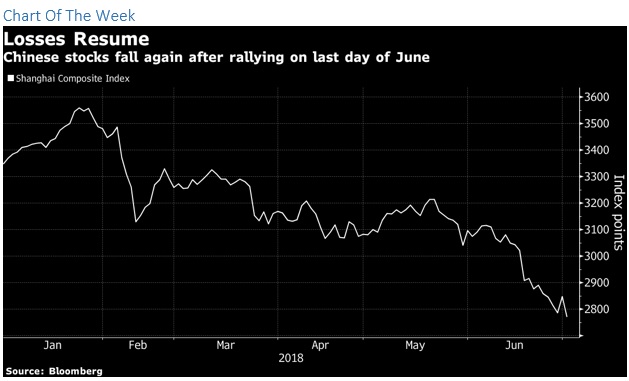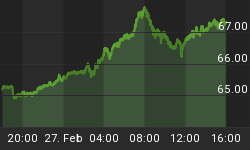Monday, July 2, 2018
Trade disputes continue to cloud markets. President Trump has reportedly told his advisers he wants to withdraw from the World Trade Organization. The consequences would be so profound that, for now, few expect it to happen. However, the trade war is escalating. Canadian tariffs on U.S. steel went into effect. China’s currency is under pressure, in part, because of U.S. tariffs. The trade war could yet take a turn for the worse with the Trump administration looking into tariffs on imported cars and trucks. Stocks opened down in early trading on Monday.

(Click to enlarge)
- China’s Shanghai Composite Index has entered bear market territory, having fallen more than 20 percent since January. The index fell 8 percent in June alone.
- The selloff continued on Monday, falling 2.5 percent, on fears of downward pressure on China’s currency, tighter housing regulations and the fallout from U.S. trade tariffs.
- China’s stocks have lost nearly $2 trillion in value this year.
Markets
EU warns of $300 billion in penalties if U.S. puts up auto tariffs. The Trump administration has threatened to impose tariffs on imported cars, which is clearly a red line for Brussels. The EU said auto tariffs would lead to a full blown trade war. In a statement, Brussels also said that the EU and other major economies would respond with nearly $300 billion in countermeasures, which would amount to tariffs on nearly 20 percent of total U.S. goods exports. Related: The Leaders In The Quantum Computing Race
Automakers warn of layoffs, higher prices due to U.S. tariffs. A series of carmakers warned the Trump administration that U.S. tariffs would lead to job losses and higher sale prices for their vehicles. Toyota (NYSE: TM) said that it would have to hike the price of its highly popular Camry by $1,800 if the Trump administration moved forward with a 25 percent tariff on imported cars. But it wasn’t just foreign-owned companies. GM (NYSE: GM) warned the tariffs would lead to “less investment, fewer jobs and lower wages” for its employees, while also adding thousands of dollars to the price of its cars.
Canada weighs broad steel tariffs. In a sign that the U.S.-inspired trade war is mushrooming, Canada is weighing broad steel tariffs to prevent leakage of steel that can no longer be sent to the U.S. The tariffs on a long list of countries is an effort to stop the dumping of cheap steel into Canada. In fact, the EU is also looking at a similar set of tariffs. The proposals are the clearest sign yet that the brewing trade war won’t be targeted and precise, but instead will likely lead to an escalating series of measures that will be hard to undo.
Commodities
Gold’s trouble continues. Gold prices continue to languish, and there is near-term selling pressure from investors. “According to the CFTC’s statistics, positioning was net short again for the first time in 2½ years in the week to 26 June. Short positions in particular were built up, which means speculative financial investors are currently betting heavily on falling prices,” Commerzbank wrote in a note.
Iron ore entering cyclical downturn. The iron ore market is on the verge of entering a cyclical downturn, and could hit a low point in 2019, according to Wood Mackenzie. There is medium-term “floor price” at about $50-$55/t.
Safehaven commodities suffer worst quarter since 2016. Gold and platinum just wrapped up their worst quarter since late 2016. Silver has held up better than other commodities, due to industrial demand. But higher interest rates and a strong dollar continue to weigh on gold and other commodities. “The U.S. dollar has been the biggest beneficiary as investors’ first choice safehaven,” said Gavin Wendt, senior analyst at MineLife Pty, according to Bloomberg.
Energy
Libya suffers 850,000-bpd disruption on port outages. Libya could declare force majeure on several oil export terminals, which would disrupt 850,000 bpd, the National Oil Corp. warned over the weekend. The disruption would take Libya’s supply down to around 300,000 bpd, and would severely tighten the oil market.
Trump wants 2 mb/d from OPEC. President Trump tweeted over the weekend that OPEC agreed to increase output by 2 mb/d, a statement that was quickly walked back by the White House. In fact, Saudi Arabia only stated that it had 2 mb/d of spare capacity. Trump’s statement likely put some downward pressure on oil prices, but the markets would be wrong to think that Saudi Arabia would comply with such pressure.
Related: Tech Employees Turn Activist Over Trump Immigration Policy
AMLO wins Mexico’s presidential election, puts oil reforms at risk. Andres Manuel Lopez Obrador won Mexico’s presidential election by a landslide on Sunday, raising questions about a change of direction for the country’s energy reforms. AMLO, as he is often known, has threatened to revisit oil contracts awarded to international companies and even to halt further auctions.
Cryptocurrencies
800 crypto coins dead. Over 800 cryptocurrencies have been killed off in the past year and a half, a bubble and meltdown that has echoes of the dotcom boom in 2000. Bitcoin is down 70 percent from last year’s peak and the scrutiny from regulators is putting downward pressure on market sentiment. Still, the value raised from initial coin offerings (ICOs) is set to triple this year, hitting $11.9 billion, according to CoinSchedule, up from just $3.8 billion in 2017.
Bitcoin to surge to $50,000 by end of 2018? Arthur Hayes, co-founder and CEO of BitMex, says Bitcoin could reach $50,000 by the end of the year. He shrugged off the latest volatility and even acknowledged that prices could head lower, but he remains a bull on Bitcoin. "We could definitely find a bottom in the $3,000 to $5,000 range," he said. "But we’re one positive regulatory decision away, many an ETF approved by the SEC, to climbing through $20,000 and even to $50,000 by the end of the year."
BTCC relaunches crypto exchange. The oldest cryptocurrency exchange, which shut down nine months ago, is relaunching. BTCC had shut down in China after a regulatory crackdown, but the exchange will open up again, offering crypto-to-fiat and crypto-only trading. BTCC, formerly BTC China, was one of China’s “Big Three” exchanges.
By Josh Owens for Safehaven.com
More Top Reads From Safehaven.com:
















